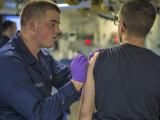Feb 17, 2004 (CIDRAP News) Complications of smallpox vaccination, such as cardiac inflammation and spreading of vaccinia virus to others, remain relatively rare after close to 600,000 vaccinations of US military personnel over the past year.
The Department of Defense (DoD) reported last week that 581,183 service members received smallpox shots between Dec 13, 2002, and Feb 11, 2004. Seventy-two vaccinees, or about 1 in 8,072, suffered myopericarditis, and there were 30 cases of vaccinia infection in contacts of vaccinees, a rate of 1 in 19,373.
Other complications reported by DoD included 36 cases of generalized vaccinia, most of which required only outpatient treatment, and one case of encephalitis.
As reported last November, there has been one death possibly linked to smallpox vaccine in the military program. Two panels of civilian physicians concluded that a fatal lupus-like reaction in a young reservist who died last April might have been caused by smallpox and other vaccines she had received.
Five other deaths that occurred after smallpox vaccination were reviewed and judged to be unrelated to the vaccine, according to the DoD. The immediate causes of death in those cases included myocardial infarction, atherosclerotic heart disease, pulmonary embolism, heat injury, and benzodiazepine overdose.
The incidence of contact vaccinia cases in the current military programabout 5.2 per 100,000 vaccinationsis similar to rates in the 1960s, according to the Centers for Disease Control and Prevention (CDC). At that time the incidence ranged from 2 to 6 cases per 100,000 vaccinees, the CDC said in the Feb 13 issue of Morbidity and Mortality Weekly Report.
Today people are less likely to be immune to vaccinia because most have not had smallpox shots, the agency noted. The report suggested that careful screening of DoD personnel and their contacts for skin diseases, along with education about infection control, have helped keep contact vaccinia rates low.
Of the 30 cases of contact vaccinia, 18 were confirmed by laboratory tests. Sixteen of the 18 cases involved uncomplicated skin infections, and two involved the eye. None of the cases led to eczema vaccinatum or progressive vaccinia.
Sleeping together was the leading risk factor for secondary vaccinia, as 12 of the 18 cases were among spouses or adult intimate contacts, the CDC reported. Two confirmed cases resulted from tertiary transfer of the virus. As reported last week, one involved transmission of vaccinia from a service member to his wife and from her to their breast-feeding baby.
In the other tertiary case, a vaccinated soldier was wrestling with an unvaccinated soldier at a recreational function when the bandage covering his vaccination site fell off, according to the CDC. The unvaccinated man later wrestled with another unvaccinated service member. Six days later, both of the unvaccinated soldiers had lesions on their forearms, neck, and face.
Also last week, the CDC reported that no major complications (such as myopericarditis, eczema vaccinatum, generalized vaccinia, progressive vaccinia, or encephalitis) occurred in the civilian smallpox vaccination program from Aug 9 through Dec 31 of last year. However, all but about 1,000 of the 39,213 civilians who received shots last year were vaccinated before August 9, according to previous CDC reports.
The report said that from August through December there were 20 serious adverse events, such as chest pain or myocardial infarction, that followed vaccination but were not necessarily caused by it.
See also:
DoD smallpox safety summary
http://www.smallpox.mil/event/SPSafetySum.asp
Feb 13 MMWR report on secondary and tertiary vaccinia cases among
military personnel
http://www.cdc.gov/mmwr/preview/mmwrhtml/mm5305a3.htm
Feb 13 MMWR report on adverse events in the civilian smallpox
vaccination program
http://www.cdc.gov/mmwr/preview/mmwrhtml/mm5305a4.htm
Nov 19, 2003,
CIDRAP News story on possible role of vaccines in reservist's death



















